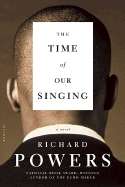Time of Our Singing

Resumen del libro
On Easter day, 1939, at Marian Anderson's epochal concert on the Washington Mall, David Strom, a German Jewish emigre scientist, meets Delia Daley, a young Philadelphia Negro studying to be a singer. Their mutual love of music draws them together, and--against all odds and better judgment--they marry. They vow to raise their children beyond time, beyond identity, steeped only in song. Jonah, Joseph, and Ruth grow up, however, during the Civil Rights era, coming of age in the violent 1960s, and living out adulthood in the racially retrenched late century. Jonah, the eldest, "whose voice could make heads of state repent," follows a life in his parents' beloved classical music. Ruth, the youngest, devotes herself to community activism and repudiates the white culture her brother represents. Joseph, the middle child and the narrator of this generation-bridging tale, struggles to find himself and remain connected to them both.
Biografía del autor
Richard Powers es autor de catorce novelas, entre las que se encuentra "Galatea 2.2", "Ganancia", "El tiempo de nuestras canciones" y "El eco de la memoria", por la que fue galardonado con el National Book Award. Asimismo, ha sido receptor de una beca MacArthur, cuatro veces finalista de National Book Critics Circle Award y profesor en las universidades de Illinois y Stanford. Con "El clamor de los bosques" fue finalista del Premio Man Booker 2018 y ganador del Premio Pulitzer 2019. Vive al pie de las Grandes Montañas Humeantes. También disponible de Richard Powers en AdN: "El clamor de los bosques", "Orfeo" y "Desconcierto".








